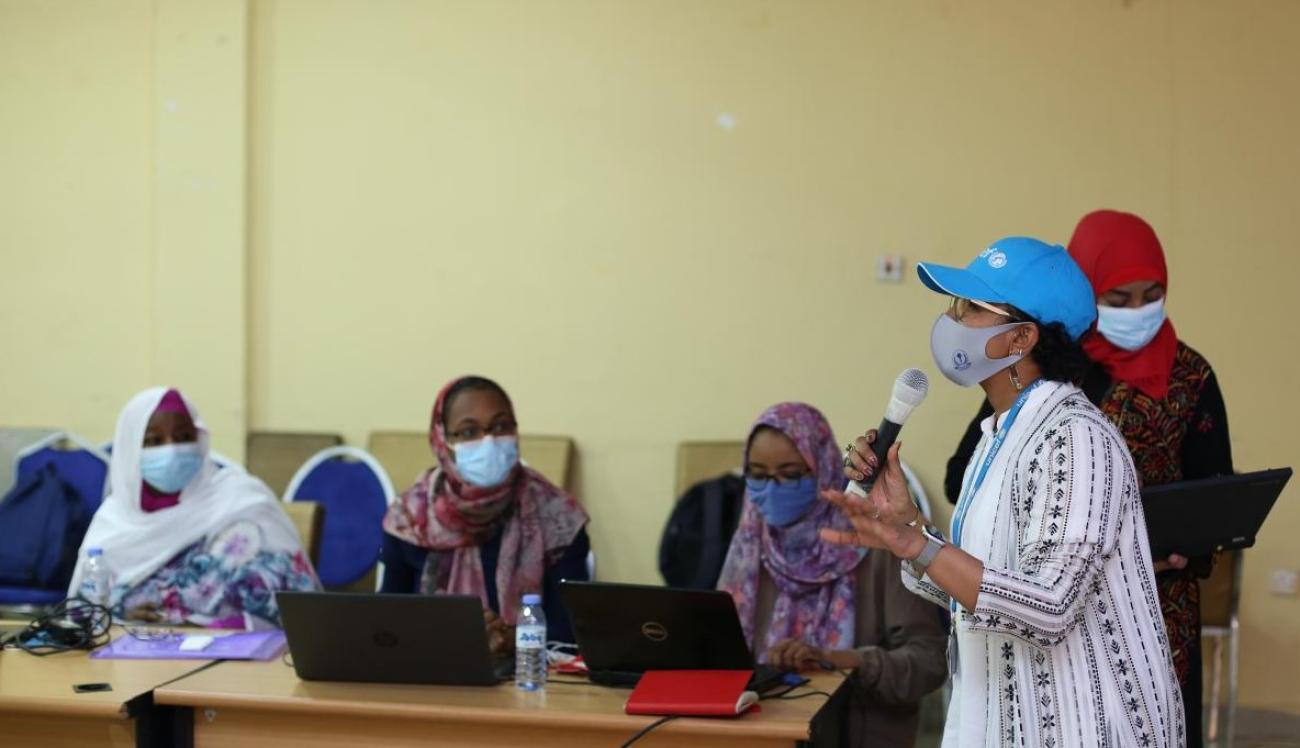UNICEF trained health promoters to spearhead Covid-19 vaccination campaign roll out in Sudan

Tackling COVID-19 hesitancy and misinformation through health promotion state coordinators
By Proscovia Nakibuuka Mbonye
Receiving Covid-19 vaccines through the COVAX partnership was a huge milestone for Sudan but ensuring a smooth roll out may present new and fresh challenges, if communities are not prepared and equipped with accurate information about the new vaccine, during the nationwide vaccination campaign roll out. When communities are put at the centre of all health promotion discussions, the hesitancy of the new vaccine will be greatly minimized.
“Informed communities are critical to a smooth roll out of vaccines,”
said Sittana Ahmed, UNICEF’s Communication for Development Specialist for immunization.
The Covid-19 vaccination campaign that begun on 9 March 2021 with frontline health workers and the elderly, in the densely populated Khartoum state, also the capital city of Sudan with majority of Covid-19 confirmed cases, will soon be rolled out to rest of the country.
To create an enabling environment for the vaccine introduction, UNICEF through its Communication for Development (C4D) initiatives oriented over 25 health promotion state coordinators from 18 states on the introduction of the Covid-19 vaccine and how they can create demand for the new vaccine among the communities. The Coordinators will in turn ensure uptake of the vaccine and address any hesitancy.
Preparing communities when introducing a new vaccine to the population cannot be underestimated and the state coordinators, the people on the ground, were the best ambassadors chosen to mobilize and convince communities to get vaccinated.
Information sharing and awareness creation, addressing vaccine hesitancy, community engagement on fears and expectations, rumor tracking, monitoring and tracking, designing evidence-based messages and identification of the most appropriate channels of communication given the restrictions posed by the pandemic were at the heart of the four day orientation workshop that took place at Khartoum University.
Disseminating messages at the appropriate time when their audiences are watching, or listening was also emphasized lest the target audiences miss out on the key messages. Use of posters, television, radio, mobile vans, social media and WhatsApp were cited as some of the popular communication channels that will be embraced across the states.
UNICEF continues to lead risk communication and community engagement interventions in the national COVID-19 response, ensuring that people have accurate and correct information needed to accept the vaccine in order to minimize refusal of the vaccine.
“Together with World Health organization, we are also working very hard to fight rumours and make sure the correct information is out there and available and accessible to the public,”
said Samah Elsir, UNICEF’s Communication for Development Emergency Coordinator.
The orientation session of the health promotion coordinators is just one of the activities that UNICEF is supporting to create readiness for the new Covid-19 vaccine.
The participants, now COVID-19 ambassadors in the states, were also provided with knowledge and skills on formulating targets and indicators to measure the success or failure of their campaign strategies. This will not only create ownership of their strategies but also ensure they take responsibility of their contributions to the vaccination campaign.
By the end of the four-day orientation session, participants created micro plans that will guide their health promotion interventions for demand creation of the vaccine. This was critical to an immediate take off as soon as they returned to their localities.
Optimistic about the vaccine roll out exercise and contributing towards a Covid-19 free nation, the state coordinators committed to leveraging already existing partnerships with media stations to educate the masses about the vaccine and encourage them to take it; cascade the training to other colleagues in the state to ensure collective responsibility of the campaign; integrate health promotion in all sectors of the states and to utilizing WhatsApp to reach their audiences with key messages, demystifying rumors with facts given that it is a widely used platform.

